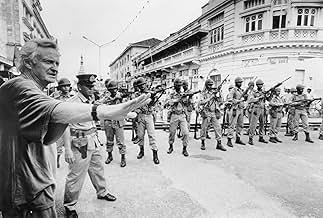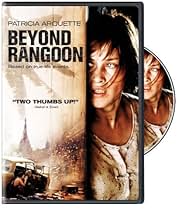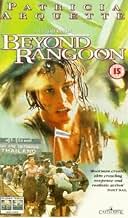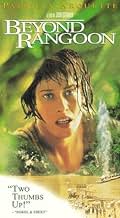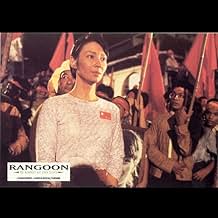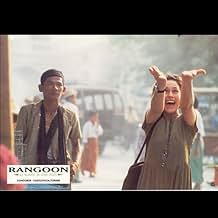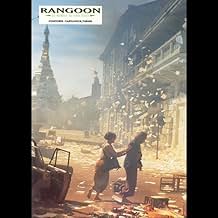IMDb RATING
6.5/10
5.6K
YOUR RATING
An American tourist finds herself in the middle of a political uprising in Burma.An American tourist finds herself in the middle of a political uprising in Burma.An American tourist finds herself in the middle of a political uprising in Burma.
- Director
- Writers
- Stars
- Awards
- 2 wins & 3 nominations total
Kuswadinata
- Colonel at Hotel
- (as Kuswadinath Bujang)
- Director
- Writers
- All cast & crew
- Production, box office & more at IMDbPro
Featured reviews
10amolad
This is one of the most underrated movies of the 1990s. If you allow yourself to identify with the Patricia Arquette character, you will find it to be a very moving story of a woman regaining a sense of purpose to her life, and finding a new will to live.
Arquette's performance is brave because it is purposefully "wooden" -- it's a way of defining her character's spiritual death, her complete lack of a desire to be alive. She moves through life like a zombie because her family has been murdered and she can't see the point of living. What is moving is how in the course of the story, she is reawakened -- by the Burmese landscape, by the beautiful quality of its people and landscapes, and by the primal choices she is forced to confront.
Boorman supports this visually (and Hans Zimmer supports it with one of his most gorgeous, haunting scores) with an often static camera and with a propensity to shoot through glass, windows, windshields, etc. We are on the outside looking in, just like Arquette.... until she finds herself deep in the jungle and is forced to choose whether or not to fight for her life.
I recommend the 1954 movie THE PURPLE PLAIN as well. It's a similar story in a similar setting, and makes for a fascinating comparison.
Arquette's performance is brave because it is purposefully "wooden" -- it's a way of defining her character's spiritual death, her complete lack of a desire to be alive. She moves through life like a zombie because her family has been murdered and she can't see the point of living. What is moving is how in the course of the story, she is reawakened -- by the Burmese landscape, by the beautiful quality of its people and landscapes, and by the primal choices she is forced to confront.
Boorman supports this visually (and Hans Zimmer supports it with one of his most gorgeous, haunting scores) with an often static camera and with a propensity to shoot through glass, windows, windshields, etc. We are on the outside looking in, just like Arquette.... until she finds herself deep in the jungle and is forced to choose whether or not to fight for her life.
I recommend the 1954 movie THE PURPLE PLAIN as well. It's a similar story in a similar setting, and makes for a fascinating comparison.
In the 90's, the American doctor Laura Bowman (Patricia Arquette) travels to Burma (presently Myanmar) with her sister and also doctor Andy Bowman (Frances McDormand) to recover from the loss of her beloved husband and son that were murdered in a theft at home. Laura sees a political pro-democracy manifestation to support the leader Aung San Suu Kyi and she decides to participate; however she loses her passport and she is not allowed to leave Rangoon.
While waiting to have another flight, Laura meets the unofficial tourist guide U Aung Ko, who is also a leader of an underground movement, and she decides to visit the countryside of Burma. However, the military dictatorship represses the movement and Laura, U Aung Ko and several civilians try to escape to Thailand in a dangerous journey.
"Beyond Rangoon" is an underrated film that has not aged, with top-notch performance of the gorgeous Patricia Arquette, I saw this film twice on VHS in the 90's and it is amazing that the military dictatorship still does exist in this country.
In accordance with the statement of John Boorman in the Extras of the DVD, the dramatic scene when the commander orders to shoot the politician Aung San Suu Kyi did really happen. Aung San Suu Kyi won the 1991 Nobel Peace Prize and shamefully was only released from house arrest on 13 November 2010. My vote is eight.
Title (Brazil): "Muito Além de Rangum" ("Far Beyond Rangoon")
While waiting to have another flight, Laura meets the unofficial tourist guide U Aung Ko, who is also a leader of an underground movement, and she decides to visit the countryside of Burma. However, the military dictatorship represses the movement and Laura, U Aung Ko and several civilians try to escape to Thailand in a dangerous journey.
"Beyond Rangoon" is an underrated film that has not aged, with top-notch performance of the gorgeous Patricia Arquette, I saw this film twice on VHS in the 90's and it is amazing that the military dictatorship still does exist in this country.
In accordance with the statement of John Boorman in the Extras of the DVD, the dramatic scene when the commander orders to shoot the politician Aung San Suu Kyi did really happen. Aung San Suu Kyi won the 1991 Nobel Peace Prize and shamefully was only released from house arrest on 13 November 2010. My vote is eight.
Title (Brazil): "Muito Além de Rangum" ("Far Beyond Rangoon")
"The trip was Andy's idea. It was easier to say 'Yes' than argue. Always that way with my sister. She meant well. A touch of the exotic east would take me away from everything that reminded me of what had happened..."
So begins the film "Beyond Rangoon", about an emotionally troubled American who is urged by her sister to take a vacation in Rangoon, Burma to try and get over the devastating loss of her husband and child. While there, she becomes entertwined in very real political upheavel. The film depicts the marches and rallies and protests realistically, and shows massacres that are hard to watch, but need to be heard. The political upheavals that really happened in Burma in 1988 were never heard or talked about in the US, and needed to be. Aung San Su Kyi was a woman who was trying to bring Burma (Now Myanmar) to democracy, but was denied by the government. She still tried to lead her people to freedom, and the struggle still exists today. The film has powerful writing, directing, cinematography and acting. The absolutely chilling and powerful score by Hans Zimmer lends riveting power to each scene, and fills triumphant moments with triumph. Patricia Arquette portrays the American, Laura Bowman, with depth, very frozen by the horrors of her loss, "I tried finding something in those stone statues, but nothing stirred in me. I was stone myself", but slowly she sees the meaning of her life and others in her journeys throughout Rangoon and beyond. A terrific film. And it needs to be watched. At home, and in history or government classes. **** stars.
So begins the film "Beyond Rangoon", about an emotionally troubled American who is urged by her sister to take a vacation in Rangoon, Burma to try and get over the devastating loss of her husband and child. While there, she becomes entertwined in very real political upheavel. The film depicts the marches and rallies and protests realistically, and shows massacres that are hard to watch, but need to be heard. The political upheavals that really happened in Burma in 1988 were never heard or talked about in the US, and needed to be. Aung San Su Kyi was a woman who was trying to bring Burma (Now Myanmar) to democracy, but was denied by the government. She still tried to lead her people to freedom, and the struggle still exists today. The film has powerful writing, directing, cinematography and acting. The absolutely chilling and powerful score by Hans Zimmer lends riveting power to each scene, and fills triumphant moments with triumph. Patricia Arquette portrays the American, Laura Bowman, with depth, very frozen by the horrors of her loss, "I tried finding something in those stone statues, but nothing stirred in me. I was stone myself", but slowly she sees the meaning of her life and others in her journeys throughout Rangoon and beyond. A terrific film. And it needs to be watched. At home, and in history or government classes. **** stars.
While the movie has its flaws, it brings to light some of the problems that come with living in a country that has no democracy. It makes you empathize with the people under such a government and makes you want to learn more about their lives, their struggles and a potential leader Aung San Suu Kyi. It makes one wonder why our government will interfere places we are not wanted yet ignore those who ask our help.
I first saw Beyond Rangoon years ago, and my interest in South East Asia has kept growing ever since.
Laura's husband and son have just been murdered. Seeing her sink into depression, her sister takes her on a tour of Burma hoping the change will somehow get her back on track. Due to a thoughtless mistake Laura finds herself trapped in the country on her own, finding herself face to face with the exactions of the military dictatorship. She meets an old professor who becomes her only way out of the country. During their escape through the Burmese jungle, tracked by the military, Laura finds herself forced to fight her way back into life. She gradually lets go of her own pain to focus on the country's wounds. And I just love the ending, it's a wise one.
I'd like to answer some other reviewers' comments: Laura is MEANT to be in that comatose don't-give-a-damn state. Arquette's interpretation is spot on. That's the sort of state I'd be in if I had seen the people I cherish the most lying in a pool of blood on my living room floor. This is what makes her wander out of the safety of the US Embassy even though as an intelligent woman she's bound to sense the danger of doing this. What's happened to her has made her almost suicidal, "I was stone myself".
The film is well paced, the acting is good, and the scenery is beautiful. Intense and food for thought, this film will be haunting you for days. That's an 8/10.
So what is Columbia waiting for to release it on DVD ??
Laura's husband and son have just been murdered. Seeing her sink into depression, her sister takes her on a tour of Burma hoping the change will somehow get her back on track. Due to a thoughtless mistake Laura finds herself trapped in the country on her own, finding herself face to face with the exactions of the military dictatorship. She meets an old professor who becomes her only way out of the country. During their escape through the Burmese jungle, tracked by the military, Laura finds herself forced to fight her way back into life. She gradually lets go of her own pain to focus on the country's wounds. And I just love the ending, it's a wise one.
I'd like to answer some other reviewers' comments: Laura is MEANT to be in that comatose don't-give-a-damn state. Arquette's interpretation is spot on. That's the sort of state I'd be in if I had seen the people I cherish the most lying in a pool of blood on my living room floor. This is what makes her wander out of the safety of the US Embassy even though as an intelligent woman she's bound to sense the danger of doing this. What's happened to her has made her almost suicidal, "I was stone myself".
The film is well paced, the acting is good, and the scenery is beautiful. Intense and food for thought, this film will be haunting you for days. That's an 8/10.
So what is Columbia waiting for to release it on DVD ??
Did you know
- TriviaSpalding Gray had previously been in another film about a South East Asian conflict: "The Killing Fields" (1984), which documented the genocide from the Khmer Rouge in Cambodia.
- GoofsWhen Patricia Arquette arrives at the railroad station, a train is standing on the track nearest the platform. When she runs to get on the train, it is just pulling in to the station.
- How long is Beyond Rangoon?Powered by Alexa
Details
Box office
- Budget
- $23,000,000 (estimated)
- Gross US & Canada
- $5,750,110
- Opening weekend US & Canada
- $2,007,527
- Aug 27, 1995
- Gross worldwide
- $5,750,110
- Runtime
- 1h 40m(100 min)
- Color
- Sound mix
- Aspect ratio
- 2.39 : 1
Contribute to this page
Suggest an edit or add missing content


